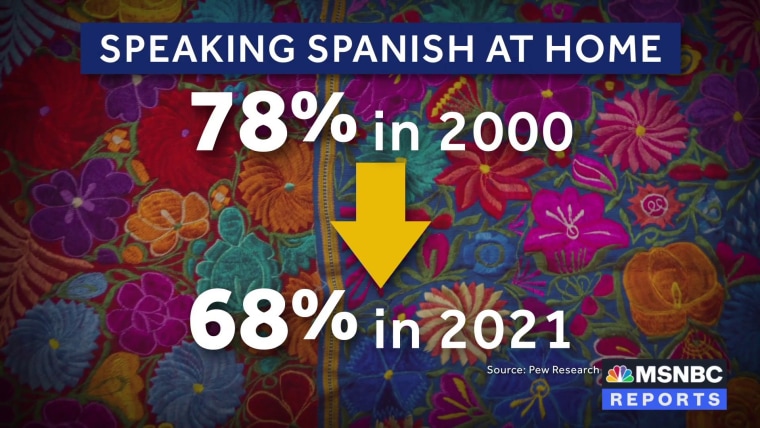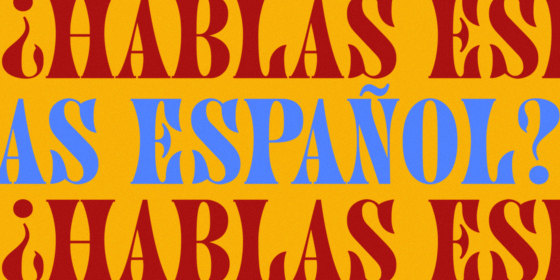We learned something inevitable last week about the estimated 63.7 million Latinos living in this country: The future continues to be more and more English-dominant.
Among the Latinos who identify as third-generation or higher, 65% said “they cannot carry on a conversation well in Spanish,” and 54% of all English-dominant Latinos reported that they “have been shamed because of it,” according to a new Pew Research Center report.
There is a wide gap between the Spanish- and English-dominant Latinos on the role of language in determining one’s identity. Among the former, more than a third said that speaking Spanish is a requisite to identifying as Latino, and 44% said it was “extremely important” for future generations to speak Spanish. By contrast, only 6% of English-dominant Latinos agree that one needs to speak Spanish to be Latino, and only 13% think it’s “extremely important” for future generations.
Half of Latinos tell us that they’ve been made to feel bad about not speaking Spanish at some point.”
mark hugo lopez
“Half of Latinos tell us that they’ve been made to feel bad about not speaking Spanish at some point. What that usually translates to is they’re either being shamed for losing a part of their culture and not being aware of their culture,” Mark Hugo Lopez, a co-author of the Pew study and the organization’s director of race and ethnicity research, said this week in a phone interview.
“There is sort of a sense that to be Latino, you have to be a Spanish speaker, and you might encounter that from, say, folks from Latin America who come to visit the U.S. and express shock or perhaps dismay that somebody who is Latino clearly doesn’t speak Spanish,” Lopez added.
English is only growing more commonplace among Latinos in the U.S.; English proficiency for Latinos ages 5 and older has increased 13 percentage points from 59% in 2000 to 72% in 2022. This means that a rise in Spanish-language purism is perhaps the worst thing that could happen to the U.S. Latino community as it continues to make a bigger mark on the American experience. An example of this arrogant attitude went viral this summer after Spanish speakers mocked a young boy for not knowing the language during a Gold Cup soccer broadcast that featured the Mexican national team. It was a perfect encapsulation of the shame that English-dominant Latinos feel when Spanish-dominant Latinos act as the sole judges of identity and belonging.
These misinformed judgments must stop if the U.S. Latino community is serious about achieving real power or permanent presence in this country. This is not a case of one European language (English) vanquishing another (Spanish). Pew noted that in 2022, 39.7 million Latinos spoke Spanish at home, which would make the United States the fourth-largest Spanish-speaking country in the world (a claim recently made by the Instituto Cervantes). Spanish will not suddenly disappear because the number of younger U.S.-born Latino monolingual English speakers keeps growing.

If that were the case, then the U.S. Latino community would fall back into the same trap from which it has been trying so hard to escape over the years. The country’s Latino electorate has demonstrated countless times that it is not, was not and never will be a one-note monolithic voting bloc. Shouldn’t the community challenge the myth that we are all Spanish speakers, recent arrivals and first-generation immigrants? If we were true to ourselves, we would know that Spanish and English are just two of a multitude of languages that constitute the Latino experience. Ask Portuguese-speaking Brazilians living in this country who consider themselves Latino. Ask Latinos who embrace their Indigenous roots and languages.
Besides, the increasing use of English in Latino communities is not wholly voluntary, a fact that Spanish speakers who come from Latin America tend to overlook. Similar to what happened to Native Americans, Spanish speakers have endured a history of educational segregation and violence, as they were forced to speak English or risk physical abuse.
Most Latino adults (78%) say it is not necessary to speak Spanish to be considered Latino, while 21% say it is.”
Pew research Center report
“Mexican American children were put through similar violent language training [as Native American students],” Alexandro José Gradilla, associate professor of Chicano/a studies at California State University, Fullerton, told NBC News earlier this month for a story about how younger English-dominant Latinos are fighting back against the shame of not knowing Spanish. “They were physically hit and beat for speaking Spanish at school. … Teachers had the right to physically punish children.”
We also need to consider that the acceptability of Spanish in schools has been sporadic and uneven at various times and places. Earlier generations pushed for Spanish, leading to the rise of bilingual education in the 1960s and ‘70s as a part of a larger educational equity movement for Latino children in this country. This was met with calls to ban bilingual education in states like California — only for the bilingual pendulum eventually to swing back again. And English-only movements tied to immigration neo-nativism have never really gone away: It is still very common to see videos of English-speaking Americans (yes, including public school teachers) berating Spanish speakers for not speaking English.
Furthermore, Latinos are no longer geographically segregated from the rest of the country, especially in states with fewer Spanish speakers. For example, since 2010, the states with the largest growth in Latino populations (of 61% or higher) are North Dakota, South Dakota, Montana, New Hampshire and Maine. The states with the slowest growth (under 14%) are New Mexico, California, Illinois and New York.

Yet, even with some Spanish speakers in the U.S. still playing the role of Latino Identity Arbiter, one finding from last week’s study should give us hope.
“Most Latino adults (78%) say it is not necessary to speak Spanish to be considered Latino, while 21% say it is,” the Pew report noted.
Lopez believes the new Pew data is not about a division among Latinos over language but about a common bond.
“It highlights our diversity and the diversity of experiences that make up this population. These results highlight how inclusive this population wants to be about who is part of it,” he said.
For that reason, if U.S. Latinos truly want to foster a community that is complex and accepting of everyone’s lived experiences, the work to stop language shaming must never end.

